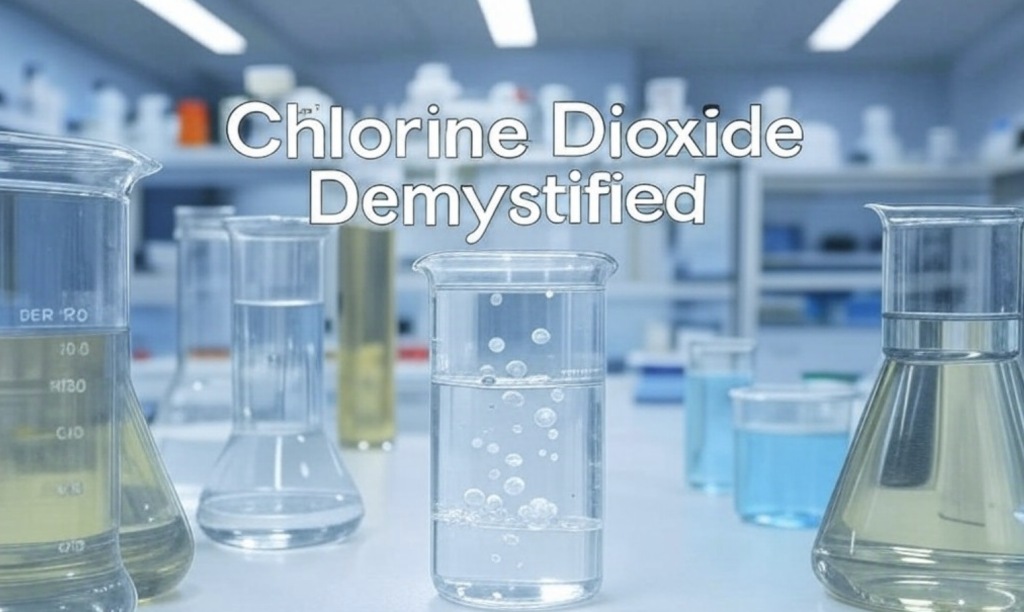Is Chlorine Dioxide Safe to Drink?
Chlorine dioxide: is it safe to drink or a dangerous chemical? This question sparks debates across health circles and online forums. Some hail it as a water purifier, while others fear its potential risks. So, what’s the real story? In this article, we’ll explore the science, myths, and facts surrounding chlorine dioxide. By the end, you’ll know exactly how to use it safely (if at all) and what the experts have to say.
What is Chlorine Dioxide, and Why Do People Use It?
Chlorine dioxide (ClO₂) is a chemical compound used primarily to disinfect water. The EPA (Environmental Protection Agency) recognizes it as a powerful water treatment solution that kills bacteria, viruses, and other harmful microorganisms. It has been used for decades in municipal water treatment plants, hospitals, and even food production facilities.
But here’s where things get controversial: some claim it has medicinal properties beyond just water purification. Certain groups promote chlorine dioxide as a treatment for illnesses, sparking warnings from health organizations like the FDA.
How Does Chlorine Dioxide Work?
Chlorine dioxide works by oxidizing harmful pathogens. Unlike chlorine, which reacts with organic compounds to form potentially harmful byproducts, chlorine dioxide breaks down microbial cell walls and renders them harmless. This unique mechanism makes it a preferred disinfectant in many industries, especially where water purity is essential.
One of its biggest advantages is that it doesn’t produce trihalomethanes (THMs), which are carcinogenic byproducts found in traditional chlorine disinfection. This makes chlorine dioxide a safer and more effective alternative in many water treatment applications.

Is Chlorine Dioxide Safe to Drink?
Short answer: Yes – but only in extremely small, regulated amounts.
The EPA sets a safe limit of 0.8 ppm (parts per million) for chlorine dioxide in drinking water. This level is considered safe for human consumption because it effectively disinfects water without posing health risks. However, drinking concentrated or improperly diluted chlorine dioxide can lead to serious health issues, including nausea, vomiting, and respiratory problems.
What Health Authorities Say:
- EPA: Approved for disinfecting drinking water when used at safe levels.
- FDA: Warns against consuming chlorine dioxide products sold as “miracle cures.”
- WHO (World Health Organization): Lists it as an effective water treatment agent but does not endorse it for medical use.
Many people mistakenly believe that just because something purifies water, it must be safe to drink directly. That’s not always the case. Just like bleach can disinfect surfaces but is dangerous if swallowed, chlorine dioxide must be used only at safe levels.
Is Chlorine Dioxide a Medical Treatment?
Let’s get this straight: Chlorine dioxide is not a cure for diseases.
Despite some claims on the internet, there’s no scientific evidence that chlorine dioxide cures cancer, COVID-19, or any other illness. The FDA has issued multiple warnings about the dangers of consuming high doses of chlorine dioxide, especially products marketed as “Miracle Mineral Solution” (MMS).
Debunking Common Myths
There are many misleading claims floating around about chlorine dioxide’s supposed health benefits. Let’s break them down:
- “Chlorine dioxide cures COVID-19.” → False. There’s no scientific proof of this.
- “It detoxifies your body.” → Your liver and kidneys already do that!
- “It’s completely natural.” → It’s a chemically synthesized compound.
What happens if someone drinks too much? Overuse can cause severe dehydration, stomach irritation, and even damage to the blood cells. In short, while chlorine dioxide is fantastic for disinfecting water, it’s not a medical miracle.
How is Chlorine Dioxide Used Safely?
Chlorine dioxide is widely used in various industries, but safe usage is key. Here are the most common and approved applications:
1. Water Treatment
Chlorine dioxide is used to purify drinking water, making it free from bacteria and viruses. If you’re using chlorine dioxide drops to treat water, always follow the recommended dilution instructions carefully.
2. Food Safety
The FDA approves chlorine dioxide for use in food processing. It’s often used to wash fruits, vegetables, and poultry to eliminate harmful bacteria like Salmonella and E. coli.
3. Medical Sterilization
Hospitals use chlorine dioxide to sterilize equipment and disinfect surfaces. It’s effective against a wide range of pathogens and plays a crucial role in preventing infections in medical settings.
Does Chlorine Dioxide Have Side Effects?
If used properly, chlorine dioxide is considered safe for water purification. However, misusing or consuming high doses can lead to:
- Nausea and vomiting
- Irritation in the digestive tract
- Damage to red blood cells
In extreme cases, ingesting large amounts can lead to dangerous oxidative stress in the body, causing serious harm to organs. This is why regulatory agencies strongly discourage drinking concentrated chlorine dioxide solutions.

Should You Use Chlorine Dioxide for Water Purification?
If you’re looking for a safe and effective way to purify water, chlorine dioxide can be a great choice – as long as you use it correctly. Many campers, hikers, and emergency preparedness enthusiasts use chlorine dioxide drops to ensure safe drinking water in remote areas.
Looking to buy high-quality Chlorine Dioxide Water Purification Drops? Check out our water treatment solutions here. Use the discount code JAY12 for 12% off your entire order!
Final Thoughts
So, is chlorine dioxide safe to drink? Yes, when used correctly for water disinfection. It’s an excellent tool for ensuring clean water, but it’s not a medical cure and should never be consumed in high concentrations. Stick to the proper guidelines, and you’ll enjoy all the benefits of clean, germ-free water without any risks.
However, misinformation about chlorine dioxide is widespread. Some promote it as a cure-all, while others dismiss its usefulness entirely. The truth lies in the middle: it’s a powerful disinfectant when used properly, but misuse can be harmful. Like pretty anything else.
If you’re considering using chlorine dioxide for water treatment, do your research, follow guidelines, and use it responsibly. Clean water is essential, and knowing the right tools to ensure its safety is crucial.
Want to learn more about clean water solutions, health tips, and exclusive discounts? Subscribe for updates and special savings, Sign up here.
Stay informed and take control of your water safety!





